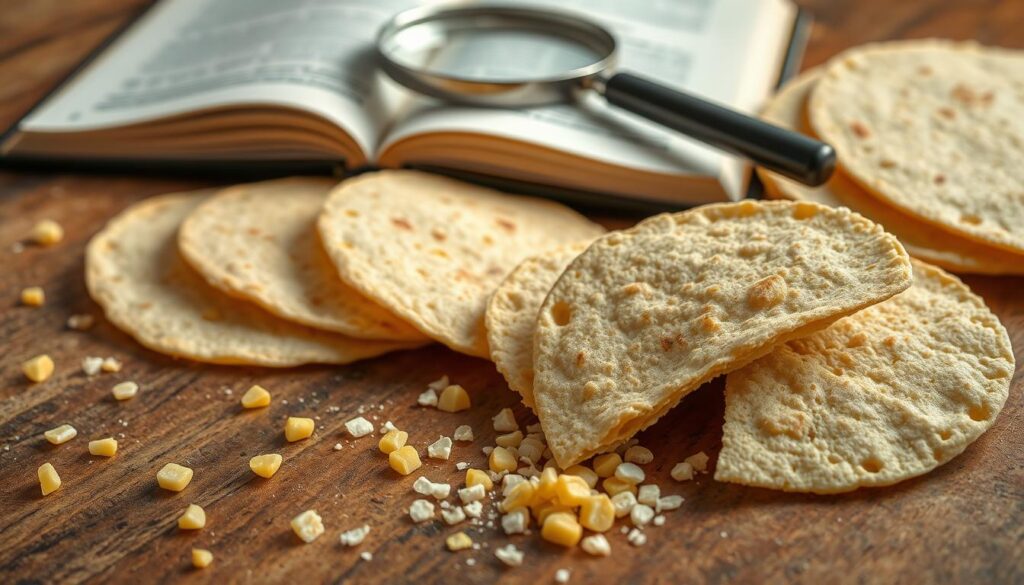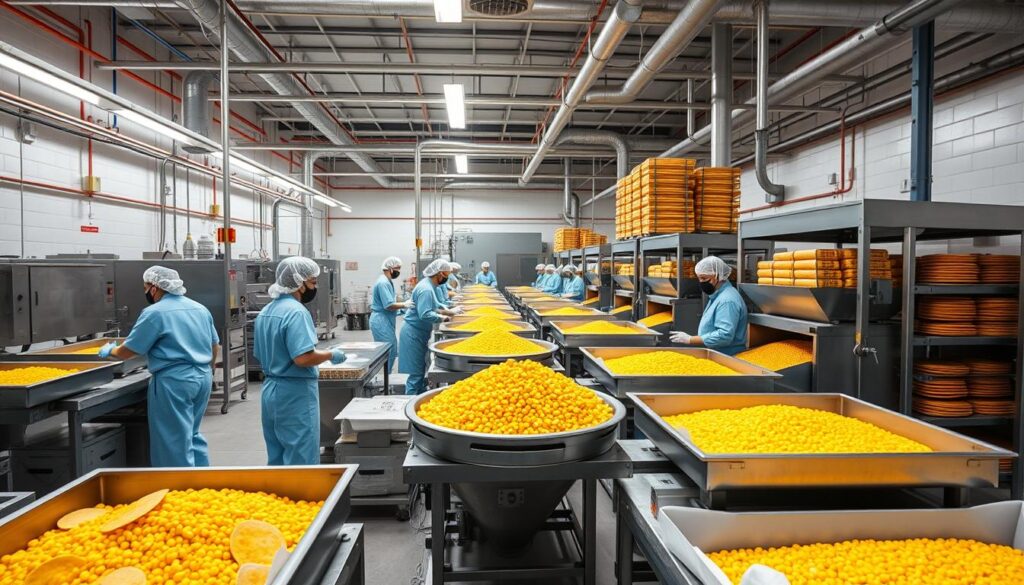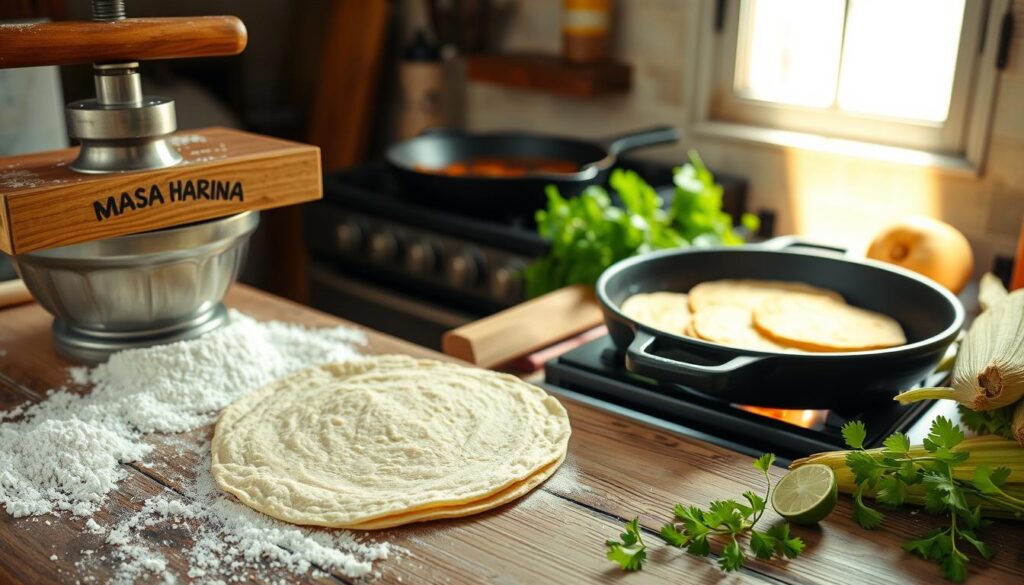
Growing up in a Mexican-American household, corn tortillas were more than just food—they were a cultural connection. My grandmother’s hands would skillfully press fresh masa into perfect circles, filling our kitchen with warmth and tradition. But as dietary concerns became more prevalent, I found myself wondering: are these beloved corn tortillas truly gluten-free?
If you’re navigating the complex world of Mexican cuisine and gluten sensitivity, you’re not alone. Corn tortillas represent a staple in Mexican food, but understanding their gluten content can be confusing. This exploration will uncover the truth about corn tortillas and their relationship with gluten.
Your health and dietary choices matter, and getting accurate information about corn tortillas is crucial. Whether you have celiac disease, gluten sensitivity, or simply want to make informed food choices, this guide will provide clear insights into the gluten status of these traditional Mexican staples.
Key Takeaways
- Corn tortillas are naturally gluten-free when made with traditional ingredients
- Cross-contamination can introduce gluten during production
- Always check labels for certified gluten-free verification
- Traditional Mexican corn tortillas use masa harina, which is gluten-free
- Homemade tortillas offer the most control over gluten exposure
Understanding Gluten: A Comprehensive Overview
Gluten has become a big topic in nutrition, leading to debates about health and food choices. For many, knowing about gluten is key, especially with foods like taco shells and masa harina. Let’s explore why this protein is so important.
What Makes Gluten Controversial
Gluten is a protein in wheat, barley, and rye that makes bread chewy. About 1% of Americans have celiac disease, a condition that makes gluten very harmful.
- Celiac disease can damage the small intestine
- Even a small amount of gluten can harm the intestine
- Many cases are not diagnosed
Common Sources of Gluten
Gluten is found in many places, including some taco shells and processed foods. Here are some common sources:
| Food Category | Gluten Potential |
|---|---|
| Bread | High |
| Pasta | High |
| Processed Snacks | Moderate |
| Corn Tortillas | Low (check labels) |
Health Implications of Gluten Consumption
For those with gluten sensitivity, eating gluten can cause serious health problems. Symptoms include:
- Digestive issues
- Fatigue
- Balance problems
- Potential developmental issues in children
2.5 million Americans remain undiagnosed and at risk for gluten-related health problems.
Looking for gluten-free options? Try corn-based wraps and masa harina products. They are healthy choices for those avoiding gluten.
Traditional Mexican Corn Tortillas: Ingredients and Production
Authentic tacos start with corn tortillas, the heart of Mexican cuisine. These flatbreads are a big part of Mexican culture. They are made with simple but essential ingredients.
The magic of corn tortillas comes from corn masa. It turns simple corn into a tasty base for your favorite dishes. Here’s what you need to know about making traditional corn tortillas:
- Primary ingredients: Masa harina, warm water, and fine sea salt
- Ideal ratio: 2 cups masa harina to 1/2 teaspoon salt
- Water requirement: Approximately 1.5 cups warm water
- Recommended tortilla size: 4-5 inches in diameter
A tortilla press is key to making perfect corn tortillas. It helps you get even thickness and size easily. Here’s how to use a tortilla press:
- Prepare a medium-sized dough ball (35-40 grams)
- Place the dough between two pieces of plastic
- Press firmly to create a thin, even tortilla
- Cook on a medium-high heat skillet
“The art of making corn tortillas is more than cooking—it’s preserving a cultural tradition.” – Mexican Culinary Expert
Cooking techniques are crucial for perfect corn tortillas. Each side needs 40-60 seconds of cooking. Wait 10 seconds before flipping for a lighter texture.
| Tortilla Characteristic | Details |
|---|---|
| Carbohydrate Content | 12.5 grams per tortilla (based on 15 tortillas) |
| Storage Duration | 2-3 days in refrigerator |
| Dietary Consideration | Naturally gluten-free and vegan |
Pro tip: Always adjust water quantity based on your specific masa harina brand to achieve the perfect dough consistency.
The Composition of Corn Tortillas and Gluten Content
Maize flatbread, or corn tortillas, is a key part of traditional Mexican food. They are made from simple ingredients that make them unique compared to other breads.
Basic Ingredients in Authentic Corn Tortillas
Traditional corn tortillas are made from just two things:
- Masa harina (corn flour)
- Water
The Role of Masa Harina
Masa harina is key in making real corn tortillas. It’s made from corn that’s soaked and cooked in an alkaline solution. This process, called nixtamalization, boosts the corn’s nutritional value and gives it a special flavor.
Manufacturing Process and Gluten Risk
Making corn tortillas means no gluten worries. Since masa harina is pure corn, it has no gluten. This makes corn tortillas safe for people with gluten sensitivities.
“Corn tortillas represent a pure, traditional Mexican food that connects us to ancient culinary practices.” – Traditional Mexican Chef
When buying corn tortillas, check the packaging for gluten-free labels. This ensures they are safe for those with dietary restrictions.
Cross-Contamination Risks in Corn Tortilla Production

Exploring gluten-free Mexican cuisine means understanding cross-contamination risks in corn tortilla production. Corn tortillas are naturally gluten-free. But, manufacturing processes can introduce gluten contamination.
“Vigilance is key when selecting corn tortillas for a gluten-free diet”
Shared production facilities are the main cause of cross-contamination. Research shows big risks in corn product processing:
- 16% of corn flour samples tested contained gluten exceeding safe thresholds
- Facilities processing wheat products pose higher cross-contamination risks
- Shared equipment can transfer trace gluten amounts
To stay safe, choose certified gluten-free corn tortilla brands. Celiac Canada suggests checking product labels, especially for cornmeal as a main ingredient.
| Risk Factor | Gluten Potential |
|---|---|
| Homemade Tortillas | 0% (with certified ingredients) |
| Commercial Shared Facilities | High Risk |
| Dedicated Gluten-Free Lines | Minimal Risk |
When buying corn tortillas for gluten-free Mexican cuisine, choose brands with clear manufacturing processes. Look for those with dedicated gluten-free production lines.
Comparing Corn Tortillas vs Flour Tortillas
When you look at tortillas, knowing the difference between corn and flour is key. Each type adds something special to your meal, especially for taco shells or gluten-free wraps.
Nutritional Breakdown
Corn and flour tortillas have different nutritional profiles. Corn tortillas have fewer calories and more fiber. This makes them great for those watching their health.
| Nutritional Aspect | Corn Tortillas | Flour Tortillas |
|---|---|---|
| Carbohydrates | 47g per 2 tortillas | 49g per 1 tortilla |
| Protein | 6g per serving | 9g per serving |
| Fiber | Higher content | Lower content |
Texture and Cooking Applications
The type of tortilla changes how your food tastes and feels. Corn tortillas are firmer and chewier, great for street tacos. Flour tortillas are softer, perfect for wraps.
- Corn tortillas: Smaller, crispier, better for taco shells
- Flour tortillas: Larger, more flexible for gluten-free wraps
Dietary Considerations
For those with gluten sensitivities, corn tortillas are the best choice. They are naturally gluten-free and still taste great.
Choosing the right tortilla can transform your meal from ordinary to extraordinary.
Whether making taco shells or gluten-free wraps, knowing the differences helps you make better choices.
Safe Consumption Guidelines for Gluten-Sensitive Individuals
For those with gluten sensitivities, exploring Mexican food can be tough. It’s key to know how to eat gluten-free safely. This is especially true for those with celiac disease or non-celiac gluten sensitivity.
“Knowledge is the first step to enjoying delicious food without compromising your health.”
About 6% of Americans are gluten-sensitive. This makes it vital to learn how to eat safely. Here are some tips to help you enjoy tacos and Mexican dishes:
- Always verify the ingredients in corn tortillas
- Check for certified gluten-free labels
- Communicate dietary needs clearly when dining out
- Be aware of potential cross-contamination risks
When picking corn tortillas, focus on how they’re made. Look for brands that promise 100% masa/maiz tortillas, free from wheat.
| Gluten Sensitivity Indicator | Recommended Action |
|---|---|
| Trace Gluten Exposure | Choose certified gluten-free products |
| Restaurant Dining | Request dedicated gluten-free preparation areas |
| Ingredient Verification | Ask about marinades, sauces, and seasoning ingredients |
Pro tip: About 72% of gluten-free products have no gluten. This makes them safer for those who are sensitive.
By sticking to these guidelines, you can enjoy tacos and Mexican food safely. You’ll also meet your gluten-free diet needs.
Commercial Brands and Gluten-Free Certification
Finding corn tortillas that are gluten-free can be tough. It’s especially hard for those who love traditional Mexican food. Knowing which brands are certified gluten-free is key for those with dietary needs.
There are a few top brands in the gluten-free corn tortilla market. Here are some great choices:
- Mission Foods: Largest brand with 10 tortillas per package
- Mi Rancho: Organic option, highest-ranked in quality
- Aldi’s Store Brand: Budget-friendly alternative
When picking corn tortilla brands, keep these points in mind:
| Evaluation Criteria | Key Considerations |
|---|---|
| Gluten-Free Certification | Look for official gluten-free labels |
| Ingredient Quality | Authentic masa harina composition |
| Texture | Pliability and ability to hold fillings |
“Not all corn tortillas are created equal – certification matters for those with dietary sensitivities.”
Always check the labels for gluten-free certifications. Trusted brands usually share details about their gluten-free making process.
When looking for corn tortillas, choose brands that are open about their gluten-free making. This way, you can enjoy masa harina-based foods safely and deliciously.
Making Authentic Gluten-Free Corn Tortillas at Home
Making gluten-free maize flatbread is simpler than you think. Just a few ingredients and a tortilla press are needed. You can make delicious corn tortillas safe for those with gluten sensitivity.
Essential Equipment and Ingredients
To make perfect corn tortillas, you’ll need a few key items:
- Tortilla press (traditional or manual)
- High-quality corn masa
- Large mixing bowl
- Plastic wrap or wax paper
- Griddle or cast-iron skillet
| Ingredient | Quantity |
|---|---|
| Gluten-free corn masa | 1 cup |
| Warm water | 3/4 cup |
| Salt | 1/2 teaspoon |
| Vegetable oil | 3 tablespoons |
Step-by-Step Tortilla Making Process
Follow these simple steps to create authentic gluten-free corn tortillas:
- Mix corn masa with warm water and salt
- Knead the dough until smooth
- Let dough rest for 30 minutes
- Divide into 8 golf ball-sized portions
- Use tortilla press with plastic wrap to flatten
- Cook on stovetop at temperature 6-7
- Flip twice, cooking 30-45 seconds per side

“Making your own tortillas allows complete control over ingredients and ensures a truly gluten-free experience.” – Traditional Mexican Cooking Expert
Pro tips for perfect corn tortillas: Keep tortillas warm in a towel. Store leftovers in the refrigerator for up to 4 days. You can even freeze them for three months!
Conclusion
Exploring corn tortillas takes you back thousands of years. These gluten-free foods are more than just tasty—they’re healthy for those with dietary limits. The ancient method of nixtamalization makes them a nutritious choice, connecting us to old cooking ways.
Discovering corn tortillas opens up a world of flavors. They’re not just for those with dietary needs. From tacos to enchiladas, they bring real Mexican taste to your meals. They’re also good for your health, with less calories and more fiber.
For those with celiac disease or gluten sensitivity, or anyone wanting to try new foods, corn tortillas are a great pick. Knowing how they’re made and their health benefits lets you enjoy them without worry. They’re a key part of Mexican cooking, nourishing people for centuries.
Don’t stop learning about corn tortillas. Try making them at home, explore different brands, or learn about their cultural importance. There’s so much to discover about these gluten-free foods, one delicious bite at a time.
FAQ
Are corn tortillas naturally gluten-free?
Yes, corn tortillas made from masa harina are naturally gluten-free. They are made from ground corn. This means they don’t have wheat, barley, or rye, which are gluten sources.
How can I ensure my corn tortillas are completely gluten-free?
Look for tortillas with certified gluten-free labels. Also, check for cross-contamination risks. Choose brands with dedicated gluten-free lines and verify their manufacturing process.
What is the difference between corn and flour tortillas?
Corn tortillas are made from corn masa and are gluten-free. Flour tortillas, made from wheat flour, contain gluten. Corn tortillas have a unique texture, taste, and nutritional profile compared to flour tortillas.
Can people with celiac disease eat corn tortillas?
Generally, yes. Corn tortillas are safe for those with celiac disease or gluten sensitivity. They must be made in a dedicated gluten-free environment and certified to prevent cross-contamination.
How are traditional corn tortillas made?
Traditional corn tortillas are made through nixtamalization. Corn is treated with an alkaline solution. Then, it’s ground into masa, shaped, and cooked to make authentic Mexican corn tortillas.
What should I look for when buying corn tortillas?
When buying corn tortillas, look for gluten-free certification. Read the ingredient list carefully. Choose brands that use traditional masa harina and follow strict production protocols to prevent cross-contamination.
Can I make corn tortillas at home?
Yes, you can make corn tortillas at home. Use masa harina, water, and a tortilla press. This way, you can control the ingredients and ensure they are gluten-free, offering a safe and authentic option for those with gluten sensitivities.
Are all corn tortillas created equal?
No, not all corn tortillas are the same. While they are usually gluten-free, some commercial brands may have cross-contamination risks or additional ingredients that could introduce gluten. Always verify the production process and certification.

